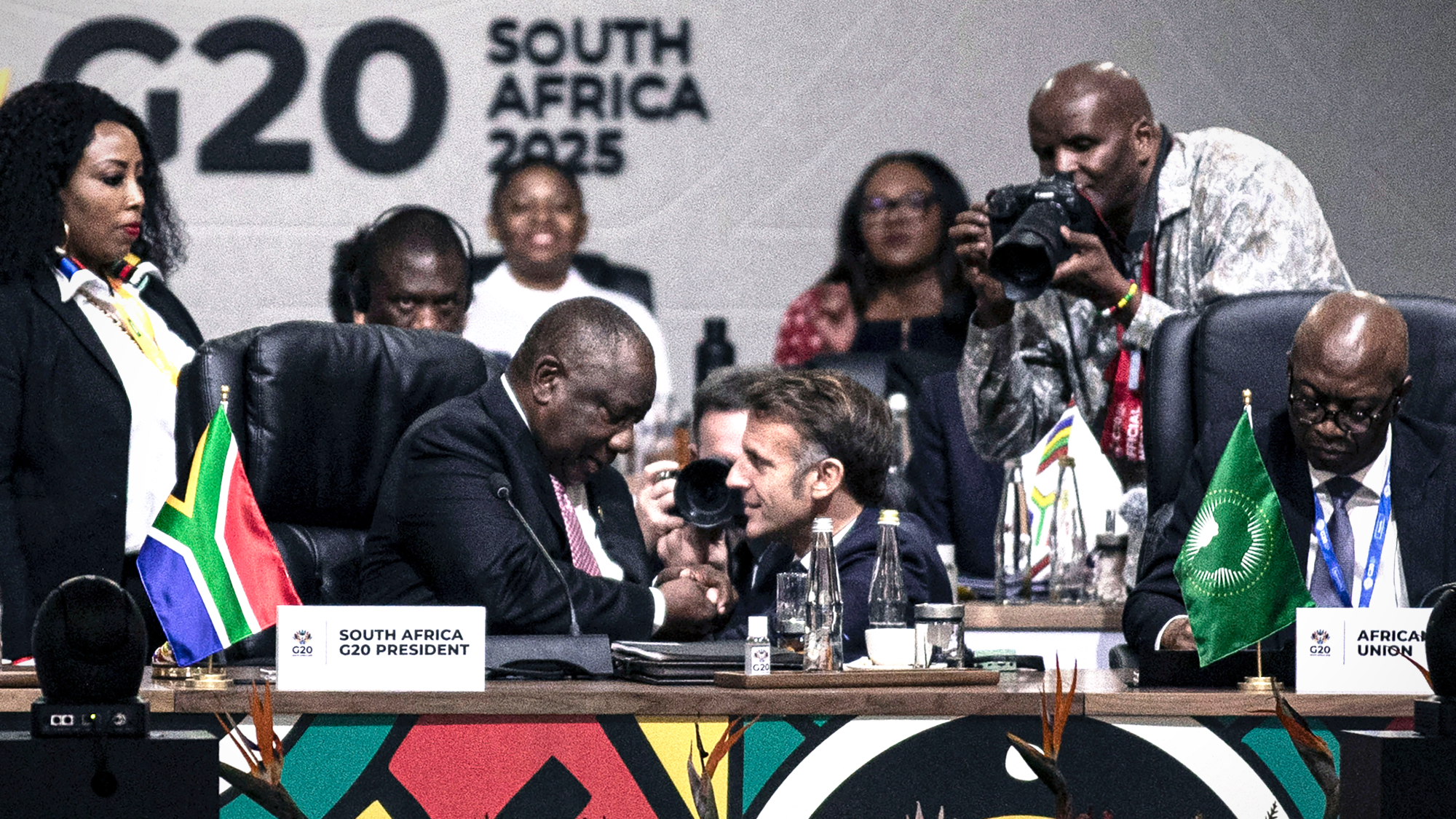Oscar Pistorius out of legal options as request to appeal rejected
Former star athlete loses bid to cut 13-year jail term for murder of Reeva Steenkamp
The international media will descend on Pretoria tomorrow for the first day of Oscar Pistorius’s trial for the alleged murder of Reeva Steenkamp. While all eyes will be on the world-famous Paralympian, it will be South Africa’s legal heavyweights who will ultimately battle it out on the court floor...
Pistorius' defence: Barry Roux
In the Pistorius camp the key figure is defence lawyer Barry Roux, a man The Guardian describes as a tough-talking “legal gun for hire”. Roux is a senior counsel – the South African equivalent of a QC – and made a strong impression at pre-trial hearings by reducing a senior police detective, Hilton Botha, to a “stuttering wreck”.
The Week
Escape your echo chamber. Get the facts behind the news, plus analysis from multiple perspectives.

Sign up for The Week's Free Newsletters
From our morning news briefing to a weekly Good News Newsletter, get the best of The Week delivered directly to your inbox.
From our morning news briefing to a weekly Good News Newsletter, get the best of The Week delivered directly to your inbox.
“This is like watching a baby seal getting clubbed,” tweeted a South African journalist as Roux’s brutal cross-examination of Botha gathered pace. The police officer was subsequently removed from the case when it was discovered he was facing seven counts of attempted murder himself. Roux was called to the bar in 1982 and now earns around 50,000R (about £3,200) a day for criminal work. He’s not as “slick or dapper” as Johnnie Cochran, the flamboyant lawyer who got OJ Simpson acquitted of murder, says the New York Post. But “he’s twice as relentless.”
Prosecution: Gerrie Nel
The man hoping to put Pistorius behind bars for the premeditated murder of girlfriend Reeva Steenkamp is equally redoubtable. State prosecutor Gerrie Nel is no stranger to big cases, having successfully jailed South Africa’s police chief Jackie Selebi on corruption charges in 2010. During the investigation of Selebi, Nel was woken by 20 police officers who arrested him and his wife in front of their children on “trumped-up fraud charges”, the Post says. The charges were later dismissed and Selebi was handed a 15-year jail term.
Top detective: Vinesh Moonoo
A free daily email with the biggest news stories of the day – and the best features from TheWeek.com
The shortcomings of the police investigation carried out in the immediate aftermath of the 14 February shooting were brutally exposed by Roux at the pre-trial hearings. But Hilton Botha’s replacement, detective Vinesh Moonoo, has a reputation as the “top gumshoe” in the South African police force. He has built a case using psychologists as well as forensic, ballistics and technology experts. The 53-year-old has a blemish-free reputation and has mostly succeeded in staying off the media radar. In one rare interview he admitted that he knew when he was a schoolboy that he wanted to become a police officer. He has since become the “top detective in the SA Police Service” according to the force’s commissioner Riah Phiyega.
Judge: Thokozile Masipa
Johannesburg High Court judge Thokozile Matilda Masipa has been assigned to the Pistorius trial. A former journalist, social worker and advocate, Masipa became the country’s second black female judge in 1998, after former Constitutional Court judge Yvonne Mokgoro, and has presided over several high-profile criminal trials. She has spoken out strongly about violence against women and has made it clear that no one is above the law. She last year sentenced notorious house robber and rapist Shepherd Moyo to 252 years in prison, reports South Africa’s Times newspaper. In 2001, she sentenced two rapists to life imprisonment, warning that violence against women and children, especially rape, were increasing at an alarming and unprecedented rate. She also made headlines when she sentenced a policeman to life imprisonment in 2009 after he shot dead his former wife. She told him: “No one is above the law. You deserve to go to jail for life because you are not a protector. You are a killer.”
Oscar Pistorius murder case: the story so far
What do we know for certain?
In the early hours of 14 February 2013, Pistorius shot Steenkamp four times through a locked toilet door at his villa in a Pretoria gated community. Three of the bullets hit her, piercing her skull and shattering her right elbow and hip bones. By the time paramedics and police arrived, at around 4.15am, Steenkamp was dead, her body covered with bloody towels. Her cause of death was given as multiple gunshot wounds.
What charges does Pistorius face?
The athlete, who currently remains free on bail, has been charged with murder and the illegal possession of ammunition in his Pretoria home. He was also charged with recklessly shooting his gun out of the open sunroof of a car in 2012 and firing someone else's handgun at a restaurant weeks before Steenkamp's death. However, the latter two charges may be dealt with at a later date.
What is Pistorius's defence?
Pistorius denies murder, claiming he shot Steenkamp because he mistakenly believed she was a dangerous intruder. In his defence affidavit, he insists that they had been "deeply in love" and that he could not have been happier before she died. They went to bed after a quiet dinner on 13 February, said Pistorius, but he later awoke in the night and heard a noise in the bathroom. Pistorius claims it was pitch black and that he thought Steenkamp was in bed. Without stopping to put on his prosthetic legs, he took the 9mm Parabellum he kept under his bed and headed for the toilet – a small cubicle with a door within his bathroom.
Feeling vulnerable without his prosthetic legs, he screamed at the "intruder" to get out of the house and for Steenkamp to phone the police, he said. Then he fired four shots at the door and returned to the bed. Realising that it was empty, he called out for Steenkamp and tried to get into the toilet, first by putting on his legs and kicking at the door, then successfully using a cricket bat to bash through the door panels. He found Steenkamp slumped over but alive and called for an ambulance. She died in his arms as he tried to get her to hospital.
What is the prosecution arguing?
Prosecutor Gerrie Nel has questioned Pistorius's story, asking why a burglar would lock himself in a toilet and how the athlete had grabbed his pistol from under the bed without noticing that the bed was empty. Why, Nel asked, did Steenkamp not speak to him from the toilet as he called out her name? And even if Pistorius did believe Steenkamp was an intruder, the prosecution says it does not change the fact that he fired the shots with the intention to kill. Nel is seeking to prove Pistorius committed premeditated murder, arguing that the offence does not require months of planning, but could simply mean walking a short distance with the intention to kill.
What sentence does Pistorius face?
If convicted of premeditated murder, Pistorius faces life imprisonment, with no prospect of parole for at least 25 years. The lesser charge of culpable homicide could still mean a decade in jail.
What other questions will be asked during the trial?
Were Pistorius and Steenkamp arguing? Police claim neighbours heard the couple fighting, with one witness reporting the sound of a woman screaming, followed by gunshots and then more screams. Whether the witnesses were actually in earshot is still to be determined.
What was Pistorius looking at on the internet? According to a leaked document believed to be part of the court investigation, the athlete was surfing porn websites on his mobile phone on the night he shot Steenkamp. The prosecution might try to argue that this contradicts his version of "a loving couple spending their time together".
What else is on Pistorius's phone? Four mobiles were allegedly found on the bathroom floor after the murder, but Pistorius claimed he had "forgotten" his passcode for one of them. Apple has helped detectives gain access to it, but police still need help in unlocking several accounts on the mobile and are experiencing bureaucratic delays in the United States.
Was Pistorius wearing his prosthetic legs? The prosecution initially claimed that Pistorius was wearing his legs when he fired the shots, strengthening the case for premeditated murder. However, a ballistic expert for the state has since said this was unlikely.
Who did Pistorius call for help? Pistorius claims he called a member of the estate's administration team to phone an ambulance and also spoke to Netcare, South Africa's largest private emergency response company. But prosecutors say security guards phoned him after the shooting to see if everything was all right and he allegedly said the situation was "fine" and did not ask for their assistance.
Will the trial be televised?
Yes, South African judges reached a landmark agreement this week to broadcast parts of the trial live from Pretoria's High Court using three small, unmanned cameras. Viewers will be able to watch the lawyers' opening and closing arguments, evidence from experts and the final judgment. However, Pistorius's testimony and that of the witnesses will not be televised. The athlete’s legal team had argued that broadcasting from the court would deny Pistorius the right to a fair trial, but judges believe that it is in the public interest to do so and would help dispel “unfounded perceptions” that the country’s legal system treats the rich and famous “with kid gloves”.
Why South African law may favour athlete
SOUTH AFRICAN law may work in Oscar Pistorius's favour during his upcoming trial for the murder of his girlfriend, Reeva Steenkamp, a criminal law expert has said.
William Booth, a practising lawyer in Cape Town, believes the prosecution will "struggle" to prove that Pistorius planned to murder his girlfriend Steenkamp on Valentine's Day last year and that the athlete may benefit from the leeway offered in the country's self-defence legislation.
In a bid to increase Pistorius's sentence, the state is seeking to prove that he committed pre-mediated murder. The Paralympian claims he believed Steenkamp was a dangerous intruder when he fired the shots.
As in the UK and United States, there is no onus on the athlete to prove his innocence. The prosecution will have to prove "beyond reasonable doubt" that Pistorius planned to murder Steenkamp.
But Booth told South Africa's News24 that it will be difficult to do so because there are no witnesses to testify that he arranged the murder beforehand. Even if he "planned" the murder in the time it took him to walk to the bathroom, there is no direct evidence, he said.
"There was nobody there except for Oscar and Reeva, and Oscar is the only one who can actually say what took place," said Booth. "The court can draw inferences, what we call circumstantial evidence, but no direct evidence."
He explained that South Africa also gives far more leeway to the use of force in self-defence than many other countries. "If you mistakenly believe that somebody is about to attack you or you believe there is an intruder in your house that poses a threat to you or the life of others in your home, you are allowed to take necessary action," he said. "That could be to shoot an intruder."
This differs from Britain, for example, where the law allows for reasonable force to be used against an intruder, but the courts tend to set a much stricter definition of what that entails.
Nevertheless, the Pretoria court will have to determine whether Pistorius's fear of danger was genuine and whether it is a sufficient defence to allow him to be acquitted.
-
 Zimbabwe’s driving crisis
Zimbabwe’s driving crisisUnder the Radar Southern African nation is experiencing a ‘public health disaster’ with one of the highest road fatality rates in the world
-
 The Mint’s 250th anniversary coins face a whitewashing controversy
The Mint’s 250th anniversary coins face a whitewashing controversyThe Explainer The designs omitted several notable moments for civil rights and women’s rights
-
 ‘If regulators nix the rail merger, supply chain inefficiency will persist’
‘If regulators nix the rail merger, supply chain inefficiency will persist’Instant Opinion Opinion, comment and editorials of the day
-
 How Bulgaria’s government fell amid mass protests
How Bulgaria’s government fell amid mass protestsThe Explainer The country’s prime minister resigned as part of the fallout
-
 Femicide: Italy’s newest crime
Femicide: Italy’s newest crimeThe Explainer Landmark law to criminalise murder of a woman as an ‘act of hatred’ or ‘subjugation’ but critics say Italy is still deeply patriarchal
-
 Brazil’s Bolsonaro behind bars after appeals run out
Brazil’s Bolsonaro behind bars after appeals run outSpeed Read He will serve 27 years in prison
-
 South Africa wraps up G20 summit boycotted by US
South Africa wraps up G20 summit boycotted by USSpeed Read Trump has been sparring with South Africa in recent months
-
 Americans traveling abroad face renewed criticism in the Trump era
Americans traveling abroad face renewed criticism in the Trump eraThe Explainer Some of Trump’s behavior has Americans being questioned
-
 Nigeria confused by Trump invasion threat
Nigeria confused by Trump invasion threatSpeed Read Trump has claimed the country is persecuting Christians
-
 Sanae Takaichi: Japan’s Iron Lady set to be the country’s first woman prime minister
Sanae Takaichi: Japan’s Iron Lady set to be the country’s first woman prime ministerIn the Spotlight Takaichi is a member of Japan’s conservative, nationalist Liberal Democratic Party
-
 Russia is ‘helping China’ prepare for an invasion of Taiwan
Russia is ‘helping China’ prepare for an invasion of TaiwanIn the Spotlight Russia is reportedly allowing China access to military training